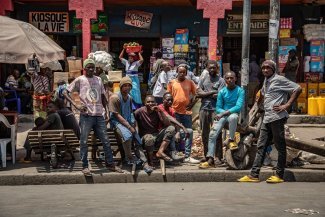The Yaoundé Emergency Centre, pictured here in October, was the scene of a strike by temporary staff demanding their rights and better working conditions.
Calm appears to have returned to the Yaoundé Emergency Centre this October. Staff go about their daily business, showing no outward signs of the strike that took place here in May, which triggered several days of walkouts in Cameroon’s public hospitals. Recruited directly by hospital administration, more than 27,000 temporary employees throughout the country have been waiting endlessly for contracts to join the civil service.
The present lull followed a decision by the Cameroonian government on 20 June to set up an inter-ministerial committee to examine the demands made by healthcare workers and propose concrete measures. Overseen by Prime Minister Joseph Dion Ngute, the committee decided to suspend the practice of using temporary staff in public hospitals, thereby withdrawing recruitment power from hospital administrators.
In the months following the strike – which was not the first of its kind – the inter-ministerial committee held a series of consultation meetings with representatives of the sector’s unions and prioritised the issue of temporary employees.
Thousands of profiles are currently being examined with a view to formalising their status and integrating them into the civil service as soon as possible.
Other problems remain, however, and discontent continues to simmer. Flore Bissene, 34, is an office manager at the Yaoundé Emergency Centre. Her employment status is temporary and she receives a monthly salary of 69,000 CFA francs (€105). While the centre’s administration deducts social security contributions from her salary every month, she has had no social security cover for years.
“The contracts we signed stated that office managers would receive a salary of 75,000 CFA (€114). This was never respected as we continue receive 69,000 CFA (€105). When we contacted our administration to find out where the remainder [6,000 CFA, or €9] had gone, we were told that it had been transferred to the CNPS [Caisse Nationale de Prévoyance Sociale] for our social security contributions. We checked this and discovered that it was not the case,” says Bissene, who is also a staff union representative at the Yaoundé Emergency Centre.
She and 241 other employees at the hospital, including nurses, orderlies and managers, have no social security cover and are still waiting to be integrated into the civil service. Some have been working for the state for almost ten years but still lack contracts. According to these workers, the hospital administration – which did not respond to our request for information – has refused their demands for years.
Long-standing grievances and chronic understaffing
The demands of medical and health workers are generally for improvements in their socio-professional conditions. The Syndicat National des Personnels Médico-Sanitaires du Cameroun (SYNPEMS) has been defending the interests of these workers for two decades and regularly lobbies the Cameroonian government to regularise the status of temporary workers in the sector.
According to the union’s president Balla Balla, “these demands are made all the time. They may change form at times but they essentially remain the same,” he laments. The strikers have made more than a dozen demands to the government but thus far only one has been examined by the inter-ministerial committee.
While this represents an important first step, it is not enough to guarantee real progress for temporary staff, according to the trade unionist: “We have yet to see any concrete solutions. When we [the committee] finished the technical work of identifying temporary health staff, we submitted it to the government for a decision. I can say that the public authorities are only at the beginning of the negotiations. It is nevertheless an important step, while we wait for the committee to address the other points raised in our demands”.
In 2022, as worker walkouts reached their height and paralysed services in public hospitals, the Ministry of Health and the unions reached an agreement for a four-month suspension of the strike, as stated in a Ministry memorandum. When the agreement expired at the end of December 2022, the trade unionists’ claims remained unresolved and they decided to renew their action in 2023.
The government often responds to worker strikes with repression, including arbitrary arrests such as those that took place at the demonstrations in May, before ultimately returning to the negotiating table.
In Cameroon, medical and health care staff are contracted to the civil service by means of a direct competitive examination organised by the Ministry of Health. In 2023, the government decided to recruit only 230 medical and health personnel, i.e. barely 1 per cent of the 27,000 temporary staff currently waiting to join the civil service.
In 2021, the government employed a total of 39,720 health workers, according to official figures released by the Ministry of Public Health. In addition, Cameroon’s health system has a shortfall of 55,000 staff in all categories, including a shortage of 2,000 doctors. Paradoxically, hundreds of doctors graduate from Cameroon’s public universities only to find themselves out of work.
According to Dr Orphé Hott of the Cameroon Doctors’ Union (SYMEC): “In order to be recruited in future, all doctors, whether trained in Cameroon or elsewhere, must pass a competitive examination to join the civil service, otherwise they are obliged to work in the private sector,” says the paediatrician, who also runs a community health centre in the city of Yaoundé.
It is important to note that, according to an analysis by the International Labour Organization (ILO), the quality of healthcare administered to the population depends on decent working conditions for workers in the sector. The report goes on to state that the worldwide shortage and unequal distribution of qualified healthcare workers is one of the main obstacles to providing universal access to healthcare. The UN body is working with the World Health Organization (WHO) to improve working conditions and industrial relations in the sector through sectoral labour standards and social dialogue.
Freeze on direct recruitment and corruption
Citing budgetary concerns, the government has frozen the systematic recruitment of doctors to the civil service since 2020. Since then, however, it has held competitive examinations to recruit an average of 50 doctors nationwide every year, even as the country’s labour shortage continues to grow. According to the government, Cameroon has only one doctor for every 7,000 inhabitants.
In an attempt to restrain its wage bill for government staff, Cameroon is currently pursuing a policy of streamlining recruitment to the civil service. According to a 2018 study by the Ministry of Finance, the government’s wage bill has been growing at an exponential rate in recent years. Recent data from the Ministry show that it rose from CFA 706.1 billion (nearly €1.07 billion) to CFA 1,080.1 billion (€1.64 billion) between 2012 and 2021.
According to Albert Zé, a health economist and promoter of the Institut de Recherche pour la Santé et le Développement (IRESADE), the healthcare sector is productive and hospital revenue generated by patient care could help to solve the cash flow problems that have been cited as a reason for not improving the socio-professional conditions of health workers:
“Hospital revenue declared in Cameroon averages 7 billion CFA francs [€10.6 million] a year for all public health facilities. But forecasts put this revenue at around 504 billion CFA francs [€768.3 million] a year. This means that some 497 billion CFA francs [€757.6 million] are being misappropriated.
“If these revenues had been collected in the normal way, the quotas for staff, i.e. the surplus income on their salaries, which represent 30 per cent of hospital revenues, should have been multiplied by at least six, which would mean that health workers could live decently,” says Zé, who denounces the corruption that has taken root within Cameroon.
In a report published in 2021, the National Anti-Corruption Commission (CONAC) ranked health as one of the eleven most corrupt sectors in Cameroon, citing the illicit sale of medicines in certain public health facilities and the payment of bribes for recruitment to the Cameroonian civil service.
That same year, the corrupt practices prevalent in various sectors caused financial damage of around 45 billion CFA francs (€68.6 million) to the state. The country is considered to be one of the most corrupt in the world: according to the Corruption Perceptions Index published by Transparency International in 2022, it ranks 142nd out of 180 countries that demonstrate good practices in the fight against corruption.













